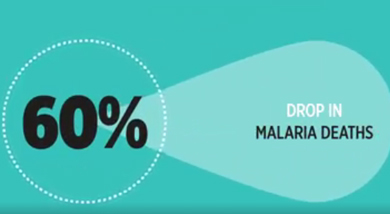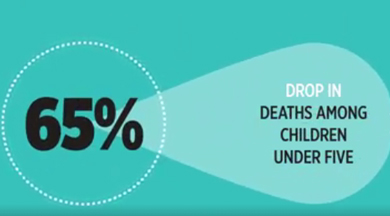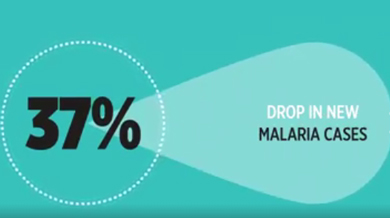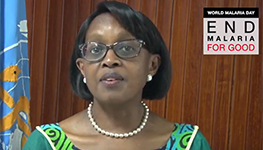Health care
South Africa marks World Malaria Day
Global stats
According to the World Malaria Report 2015 compiled by the World Health Organization (WHO), there has been a major decline in global malaria cases and deaths since 2000; mortality has decreased by 60% with 62 million lives saved. See more positive global stats from WHO:

 "Between 2000 and 2015, malaria incidence rates (new malaria cases) fell by 37% globally, and by 42% in Africa," said WHO. "During this same period, malaria mortality rates fell by 60% globally and by 66% in the African region."
"Between 2000 and 2015, malaria incidence rates (new malaria cases) fell by 37% globally, and by 42% in Africa," said WHO. "During this same period, malaria mortality rates fell by 60% globally and by 66% in the African region."
See the message from the WHO Africa regional director, Dr Matshidiso Moeti: WHO identified South Africa has one of the 21 countries able to eliminate local transmission of the disease by 2020.It's #WorldMalariaDay. Despite progress, much more needs to done for the African Region to #EndMalariaForGood pic.twitter.com/bqPXduWaVo
— WHO African Region (@WHOAFRO) April 25, 2016
WHO estimates that 21 countries are in a position to eliminate local transmission of #malaria by 2020 pic.twitter.com/GRUQrIhMTl
— WHO (@WHO) April 25, 2016
Treatment and progress
In total, 57 countries reduced malaria cases by at least 75% between 2000 and 2015, the report stated. Progress was made possible through the massive expansion of effective tools to prevent and treat malaria, such as indoor residual spraying, insecticide-treated mosquito nets, diagnostic testing and anti-malarial medicines. According to the organisation, two forms of control have proven to be effective: insecticide-treated mosquito nets (ITNs) and indoor residual spraying (IRS). It said there had been an increase in use of these methods in Africa to increase malaria prevention.- Over the last 15 years, there has been a major increase in coverage of ITNs in sub-Saharan Africa. By 2014, more than half (56%) of the population had access to an ITN, compared to less than 2% in 2000.
- In 2014, 116 million people globally were protected by IRS, including 50 million people in Africa. About 6% of the population at risk of malaria in Africa live in households that are protected by IRS.
But challenges still remain.A #malaria-free Africa is possible. We must accelerate & sustain efforts to #EndMalariaForGood pic.twitter.com/ulgXv2JUB0
— WHO African Region (@WHOAFRO) April 25, 2016
WHO's Global Malaria Programme calls on endemic countries, donors, organisations and communities to work together to eliminate and eradicate malaria, a disease that is preventable, treatable and curable. "With commitment, dedication and support of all governments and partners, the vision for malaria elimination and eradication is possible," said WHO. In endemic areas, everyone is at risk of contracting malaria, but there are some higher risk groups, including children under five years of age, pregnant women, people with compromised immune systems, travellers from non-endemic areas and immigrant workers.13 of the 15 countries accounting for 80% of global #malaria cases in 2015 are in Africa https://t.co/5lg7lFnQkK pic.twitter.com/XVU3YgvN66
— WHO African Region (@WHOAFRO) April 25, 2016
Signs of malaria
Symptoms of the disease can be similar to those of flu, such as severe headaches, fever, joint pains, shivering episodes, nausea and vomiting. More serious symptoms include severe breathing difficulties, low blood sugar, severe anaemia, weakness of the body, convulsions, respiratory distress, jaundice, renal failure, repeated vomiting, shock, hypoglycaemia, black urine, abnormal bleeding and even coma. Malaria in South Africa is seasonal, between September and May, and occurs in certain geographical areas of Limpopo, KwaZulu-Natal and Mpumalanga.Source: South African Government News Agency and World Health OrganizationTogether we can #EndMalaria by 2018 #WMD2016 ^eN7 pic.twitter.com/fc3AwTmUoi
— Department of Health (@HealthZA) April 25, 2016
 The World Health Organization's Africa regional director, Dr Matshidiso Moeti, delivers a message on World Malaria Day on 25 April 2016. "A malaria free Africa is possible," she says. (Image: Screengrab via YouTube)
The World Health Organization's Africa regional director, Dr Matshidiso Moeti, delivers a message on World Malaria Day on 25 April 2016. "A malaria free Africa is possible," she says. (Image: Screengrab via YouTube)
Related links
Related articles
- South Africa's health minister receives international award
- South Africa wins award for fight against malaria
- Global malaria deaths drop 60% over the last 15 years
- Celebrating Africa's health heroes
- South Africa to host 21st International Aids Conference
- South Africa has made progress on Millennium Development Goals – Zuma
Tackling HIV/Aids>
Government, business & civil society initiatives to improve South Africans' lives. >Health care in South Africa
How our public health care system works, how it relates to our fast-growing private health care sector, and the challenges it faces from Aids, tuberculosis and malaria. >South Africa health FAQ
What are South Africa's emergency services like? Where can I find a private clinic or GP in my area? What medicines are available over the counter? >Health tips for travellers
South Africa is a safe destination with good levels of hygiene and drinkable water. There are nonetheless some health issues that you should be aware of. >Daily health news, A-Z database of diseases,
health tips, travel
health, free "ask an expert" e-mail service, and more from Health24.







